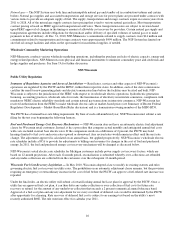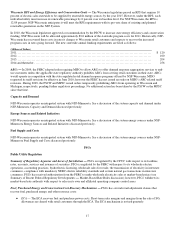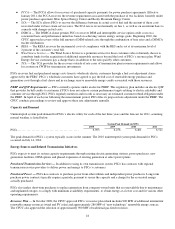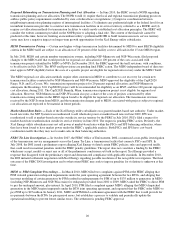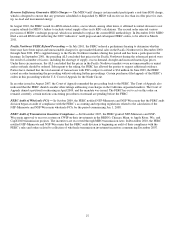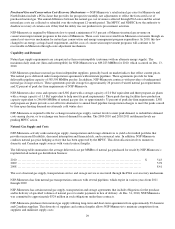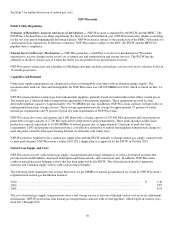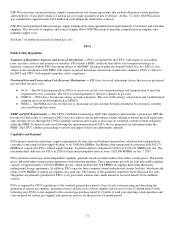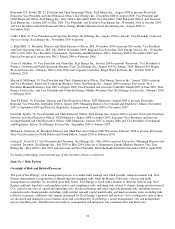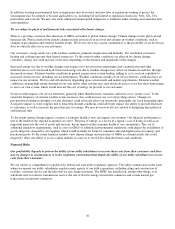Xcel Energy 2010 Annual Report Download - page 36
Download and view the complete annual report
Please find page 36 of the 2010 Xcel Energy annual report below. You can navigate through the pages in the report by either clicking on the pages listed below, or by using the keyword search tool below to find specific information within the annual report.26
Proposed Rulemaking on Transmission Planning and Cost Allocation — In June 2010, the FERC issued a NOPR regarding
transmission planning and cost allocation. The NOPR would (1) require that local and regional transmission planning processes
address public policy requirements established by state or federal laws or regulations; (2) improve coordination between
neighboring transmission planning regions of interregional facilities; (3) eliminate any preferential right at the federal level for an
incumbent transmission provider to construct new transmission facilities in its service territory, referred to as a ROFR; and (4)
require cost allocation methods for transmission facilities to satisfy newly established cost allocation principles. The FERC will
consider the written comments provided on the NOPR prior to adopting a final rule. The content of the final rule cannot be
predicted at this time; however, limiting an incumbent utility’s preferential ROFR to build transmission in its service territory
states may have a negative impact on longer-term growth opportunities for the Xcel Energy utility subsidiaries.
MISO Transmission Pricing — Certain new higher voltage transmission facilities determined by MISO to meet RECB eligibility
criteria in the MISO tariff are subject to an allocation of 20 percent of the facility costs to all loads in the 15 state MISO region.
In July 2010, MISO and certain member transmission owners, including NSP-Minnesota and NSP-Wisconsin, filed proposed
changes to the MISO tariff that would provide for regional cost allocation for 100 percent of the costs associated with
transmission projects identified by MISO as MVPs. In December 2010, the FERC approved the tariff revisions, with conditions,
to be effective in July 2010. The MVP tariff provisions are pending final FERC action. The MISO independent board of directors
must approve MVP eligibility before the costs of a specific project are eligible for regional rate recovery under the MISO Tariff.
The MISO regional cost allocation methods require other customers in MISO to contribute to cost recovery for certain new
transmission facilities constructed by NSP-Minnesota and NSP-Wisconsin. MISO approved the eligibility of the CapX2020
Fargo, N.D. and La Crosse, Wis. transmission expansion projects for 20 percent regional allocation; and NSP-Minnesota
anticipates the Brookings, S.D. CapX2020 project will be recommended for eligibility as an MVP, and thus 100 percent regional
cost allocation, during 2011. The CapX2020 Bemidji, Minn. transmission expansion project is not eligible for regional cost
allocation. However, NSP-Minnesota and NSP-Wisconsin also pay a share of the costs of projects constructed by other
transmission-owning entities in the MISO region found to be eligible for regional cost allocation. The transmission revenues
received by the NSP System from MISO, and the transmission charges paid to MISO, associated with projects subject to regional
cost allocation are expected to be material in future periods.
Market-Based Rate Rules — Each of the Xcel Energy utility subsidiaries was granted market-based rate authority. Under market-
based rate rules, the NSP System was reauthorized to sell wholesale power at market-based rates in June 2009. SPS was
reauthorized to sell at market-based rate rules outside its service territory by the FERC in July 2010. PSCo filed a request for
market-based rate reauthorization outside its service territory in June 2010. The request is pending FERC action. Presently, the
Xcel Energy utility subsidiaries may not sell power at market-based rates within the PSCo and SPS balancing authorities, where
they have been found to have market power under the FERC’s applicable analysis. Both PSCo and SPS have cost-based
coordination tariffs that they may use to make sales in their balancing authorities.
FERC Tie Line Investigation — In October 2007, the FERC Office of Enforcement, DOI, commenced a non-public investigation
of the transmission service arrangements across the Lamar Tie Line, a transmission facility that connects PSCo and SPS. In
July 2008, the DOI issued a preliminary report alleging Xcel Energy violated certain FERC policies, rules and approved tariffs,
that could result in material penalties under the FERC penalty guidelines. The report does not constitute a finding by the FERC,
which may accept, modify or reject any or all of the preliminary conclusions set forth in the report. Xcel Energy provided a
response that disagreed with the preliminary report and demonstrated compliance with applicable standards. In December 2010,
the DOI initiated settlement negotiation with Xcel Energy regarding possible resolution of the non-public investigation. The final
outcome of the FERC DOI investigation and to what extent FERC may seek to impose penalties for violations is unknown at this
time.
MISO vs. PJM Complaint Proceedings — In March 2010, MISO filed two complaints against PJM at the FERC alleging that
PJM violated generation redispatch requirements under the joint operating agreement between the two RTOs, and alleging that
incorrect modeling of certain generators by PJM resulted in underpayments by PJM of up to $135 million to generators in MISO
(including NSP-Minnesota and NSP-Wisconsin) for redispatch provided from 2002 to 2009. MISO asked the FERC to direct PJM
to pay the underpaid amount, plus interest. In April 2010, PJM filed a complaint against MISO, alleging that MISO dispatched
generation in the MISO region improperly under the RTO joint operating agreement, and requested that the FERC order MISO to
pay PJM up to $25 million. In January 2011, MISO and PJM filed a settlement agreement with the FERC that would provide for
no payments between the RTOs for prior period errors, but establishes a process to validate and periodically update the
operational modeling to prevent future similar errors. The settlement is pending FERC approval.


